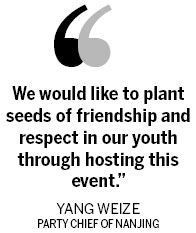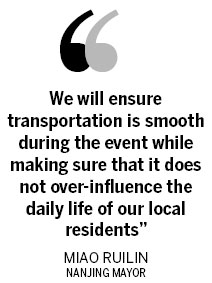|
"Young ambassadors" of this year's Youth Olympic Games gather at the ancient city wall during the four-day stay in Nanjing in late March. Xu Ning / For China Daily |
The Nanjing government is moving to improve the city's infrastructure in preparation for the upcoming Summer Youth Olympic Games, said Yang Weize, Party chief of the capital in Jiangsu province.
The event, which will be held from Aug 16 to 28, is not only a great opportunity for the city to carry out its sustainable development strategy, but also helps to promote the Olympic spirit and publicizes the importance of sports among Chinese youth, Yang added.
Nanjing won the bid in 2010 to host the 2014 games. Held every four years, the event is open to athletes from 15 to 18 years old.
"Hosting a huge event like this requires sound facilities, services and leaderships," Yang said. "We want to use this chance to improve ourselves."
The city's transportation system has been expanded to meet the expected demand from the event.

Nanjing subway Line 10, and the first phase of the Ninggao and Ningtian intercity rail lines will go into service in the near future, as will a rapid transit bus line.
The total subway length will then have grown from 80 to 180 kilometers.
At the same time, 1,400 new cabs and 2,530 buses will join the services.
"We will ensure transportation is smooth during the event while making sure that it does not over-influence the daily life of our local residents," said Nanjing Mayor Miao Ruilin.
Although Nanjing government has improved infrastructure, it sticks with rules of simplicity and frugality when it comes to the event, said the mayor.
"We have a very tight control of the event budget," Yang said.
In most of the cases, the government will rent sport venues for the games instead of building new ones.

The organizing committee also prefers to use original ideas from young people such as college students instead of paying professional institutions.
That not only helps cut expenses, but also gets young people involved in the international event, Yang said. "What we want to do is to provide a stage for the youth in Nanjing to show their talent."
Official data shows that 20,000 volunteers, mainly from universities in Jiangsu province, have joined to help the event. Most will serve as translators, greeters and publicity agents.
Not just a sports competition, the games also serve as a venue for youth to learn and communicate with each other, Yang said.
"We would like to plant seeds of friendship and respect in our youth through hosting this event," he added.
About 3,800 athletes from more than 200 countries and regions will participate in this year's Youth Olympic Games.
"It is a time for Nanjing to present itself on the international stage," Yang said.